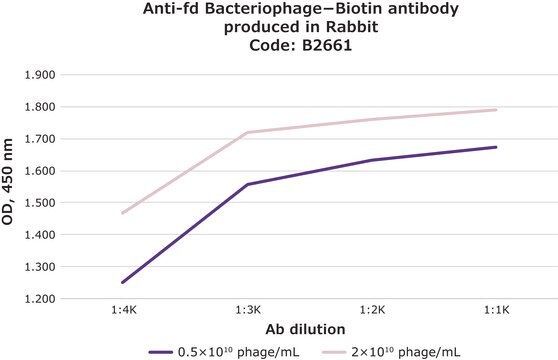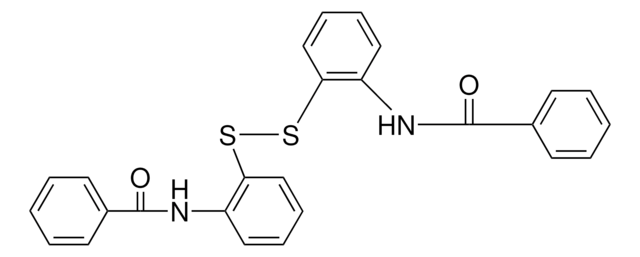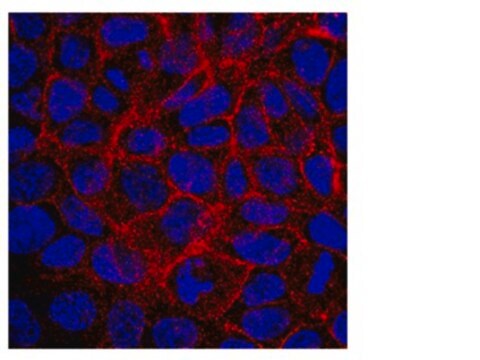B2261
bisBenzimide H 33342 trihydrochloride
≥98% purity (HPLC and TLC), powder
Sinónimos:
2′-(4-Ethoxyphenyl)-5-(4-methyl-1-piperazinyl)-2,5′-bi-1H-benzimidazole trihydrochloride, HOE 33342, Hoechst 33342, bisBenzimide
About This Item
Productos recomendados
product name
bisBenzimide H 33342 trihydrochloride, ≥98% (HPLC and TLC)
Quality Level
assay
≥98% (HPLC and TLC)
form
powder
technique(s)
titration: suitable
color
yellow
pH
1.7 (20 °C)
solubility
H2O: 20 mg/mL
phosphate buffer: precipitates
suitability
suitable for fluorescence
application(s)
diagnostic assay manufacturing
hematology
histology
storage temp.
−20°C
SMILES string
Cl[H].Cl[H].Cl[H].CCOc1ccc(cc1)C2=NCc3cc(ccc3N2)C4=NCc5cc(ccc5N4)N6CCN(C)CC6
InChI
1S/C29H32N6O.3ClH/c1-3-36-25-8-4-20(5-9-25)28-30-18-22-16-21(6-10-26(22)32-28)29-31-19-23-17-24(7-11-27(23)33-29)35-14-12-34(2)13-15-35;;;/h4-11,16-17H,3,12-15,18-19H2,1-2H3,(H,30,32)(H,31,33);3*1H
InChI key
FYEVKHPLBHLWHK-UHFFFAOYSA-N
¿Está buscando productos similares? Visita Guía de comparación de productos
Application
Excitation max. = 346 nm
Emission max. = 460 nm
Biochem/physiol Actions
Physical properties
Free dye: Excitation maximum = 340 nm, Emission maximum = 510 nm (5 mM HEPES, 10 mM NaCl, pH 7.0) DNA complex: Excitation maximum = 355 nm, Emission maximum = 465 nm (5 mM HEPES, 10 mM NaCl, pH 7.0)
Preparation Note
Aqueous solutions are stable for 1 month if kept in the dark at 2-8 °C.
Related product
Storage Class
11 - Combustible Solids
wgk_germany
WGK 3
flash_point_f
Not applicable
flash_point_c
Not applicable
Elija entre una de las versiones más recientes:
Certificados de análisis (COA)
¿No ve la versión correcta?
Si necesita una versión concreta, puede buscar un certificado específico por el número de lote.
¿Ya tiene este producto?
Encuentre la documentación para los productos que ha comprado recientemente en la Biblioteca de documentos.
Los clientes también vieron
Artículos
Cell cycle regulates vital processes like DNA repair, cancer prevention. Four stages: G1, S, G2, M. NTPs don't permeate membranes.
Cell cycle regulates vital processes like DNA repair, cancer prevention. Four stages: G1, S, G2, M. NTPs don't permeate membranes.
Cell cycle regulates vital processes like DNA repair, cancer prevention. Four stages: G1, S, G2, M. NTPs don't permeate membranes.
Cell cycle regulates vital processes like DNA repair, cancer prevention. Four stages: G1, S, G2, M. NTPs don't permeate membranes.
Nuestro equipo de científicos tiene experiencia en todas las áreas de investigación: Ciencias de la vida, Ciencia de los materiales, Síntesis química, Cromatografía, Analítica y muchas otras.
Póngase en contacto con el Servicio técnico










